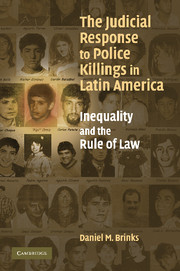Book contents
- Frontmatter
- Contents
- Preface
- 1 Effectiveness and Inequality in the Legal System
- 2 Charting Injustice in Argentina, Brazil, and Uruguay
- 3 Informational and Normative Shifts Across Jurisdictions
- 4 Buenos Aires – Political Interference and Informational Dependence
- 5 São Paulo – Normative Autonomy and Informational Failures
- 6 Uruguay – Strong Results from a Weak System
- 7 Córdoba – High Levels of Inequality in a Strong System
- 8 Salvador da Bahia – Social Cleansing Under Political and Judicial Indifference
- 9 Binding Leviathan
- Appendix: Methods, Case Selection, and Sampling
- References
- Index
7 - Córdoba – High Levels of Inequality in a Strong System
Published online by Cambridge University Press: 07 September 2009
- Frontmatter
- Contents
- Preface
- 1 Effectiveness and Inequality in the Legal System
- 2 Charting Injustice in Argentina, Brazil, and Uruguay
- 3 Informational and Normative Shifts Across Jurisdictions
- 4 Buenos Aires – Political Interference and Informational Dependence
- 5 São Paulo – Normative Autonomy and Informational Failures
- 6 Uruguay – Strong Results from a Weak System
- 7 Córdoba – High Levels of Inequality in a Strong System
- 8 Salvador da Bahia – Social Cleansing Under Political and Judicial Indifference
- 9 Binding Leviathan
- Appendix: Methods, Case Selection, and Sampling
- References
- Index
Summary
La ley se hace para todos
Mas sólo al pobre le rige.
La ley es tela de araña
En mi inorancia lo esplico:
No la tema el hombre rico,
Nunca la tema el que mande,
Pues la ruempe el bicho grande
Y sólo enrieda a los chicos.
José Hernández, La Vuelta Martín Fierro (1878), vv. 1091–92On average, rights in Córdoba are respected and enforced at almost the same rate as in Uruguay. The per capita level of police killings is comparable to Uruguay's and drastically lower than the levels in the other three locations, and the average conviction rate is about 45 percent, again very similar to Uruguay's. But if we scratch just below the surface, Córdoba's results are deeply disturbing. This jurisdiction shows the highest level of socio-economic outcome disparity of any of the systems examined here. The probability of a conviction when a police officer kills a middle-class person is nearly three times higher than when the victim is of lesser means (see Chapter 3). Conviction rates are twenty times higher if the victim's survivors are able to retain an attorney to work with the prosecutors and can organize public demonstrations. The courts' positive response is more closely conditioned on an investment of private resources here than in any of the other places we examine. In this chapter I discuss the roots of this high level of inequality, without losing sight of the fact that Córdoba does achieve an impressive conviction rate overall.
- Type
- Chapter
- Information
- The Judicial Response to Police Killings in Latin AmericaInequality and the Rule of Law, pp. 205 - 222Publisher: Cambridge University PressPrint publication year: 2007



